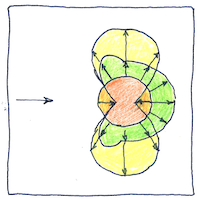Jean le Rond d’Alembert
fluid dynamics

|
D’Alembert’s paradox
The science of fluid dynamics had not yet discovered fluids stick to surfaces; that is, they have boundary layers, so when Jean le Rond d’Alembert did the math, his result showed the resistance experienced by a rigid body moving through a fluid with uniform velocity . . . is zero, which can’t be right. That’s right; his result was contradicted by both experiment and experience, so D’Alembert left it “to future Geometers to elucidate.”
Incompressible and inviscid
An incompressible fluid isn’t necessarily incompressible, but its density as it flows is approximately constant. An inviscid fluid, known as an ideal fluid, has no resistance to shear stress, that is, no viscosity. Except for superfluids, all liquids are viscid; that is, they behave as we expect them to behave. Even an inviscid fluid sticks to a surface at least a little.
Cognitive dissonance
Maybe your eyes have deceived you; maybe you’re a little confused. If belief is supported by sufficient fact, then how is it different from knowledge?



In practice, a fluid is said to be viscid if it sticks to itself more than water, and inviscid if it sticks to itself less than water. Some sources say “substantially” or “noticeably” more or less sticky than water.
See also in The book of science:
Readings in wikipedia: